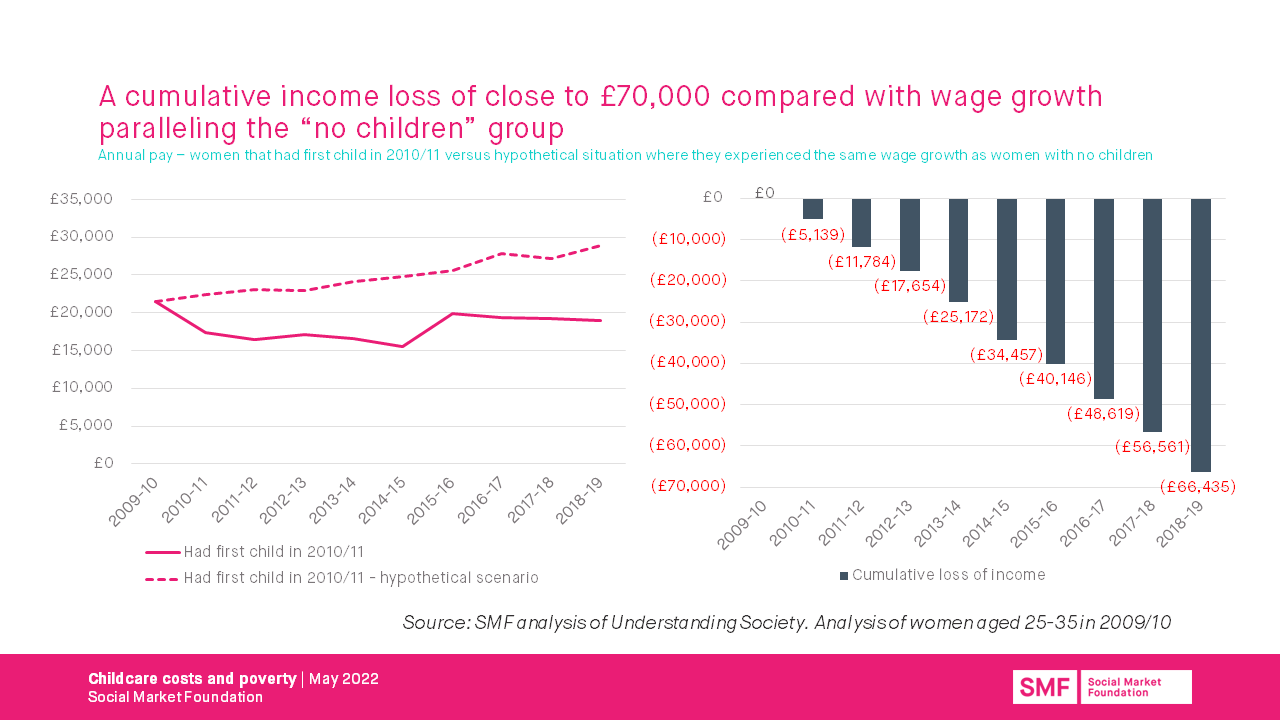Women who have a baby miss out on almost £70,000 in wages over the following decade, according to a new analysis of the impact of Britain’s childcare provision.
The Social Market Foundation revealed the new figure as it launched a cross-party commission on childcare led by Conservative and Labour MPs.
The commissioners, John Penrose MP and Siobhain McDonagh MP, will work with the SMF to analyse the impact of poor childcare provision on wages and poverty, and ways to improve provision.
The SMF, a cross-party think-tank, revealed that a woman who had her first child in 2010/11 typically suffered a cumulative income loss of £66,434 over the following nine years, relative to what would have happened if she had remained childless.
The income loss figure measures the money a woman would have earned if her career had progressed in the way that similar women without children earn. It does not take account of the additional spending that parents face.
The figures are based on new SMF analysis of the Understanding Society dataset, which tracks the experiences of around 30,000 people over decades.
Looking at women who were 25-35 in 2009/10, the SMF found that the typical woman who remained childless would have seen her earnings rise by around third over the next decade. By contrast, a woman who had a first child in 2010/11 was earning 10% less.
Women on lower incomes face the biggest losses in earnings in their child’s early years, the SMF found. In the first three years after having a baby, women on lower incomes saw their earnings fall by around 30%. But women on higher wages saw their earnings drop by around 20%.
The SMF said that the high cost and limited availability of childcare means it is often not possible for parents to work as much as they want to, leading to reduced earnings, stalled wage growth, and limited career progression.
Britain has some of the most expensive childcare in the developed world. Families paying for childcare typically spend more than 7% of their income on it, the SMF has calculated. Families on the lowest wages pay the highest share of their income on childcare.
The SMF Childcare Commission will now carry out more data analysis, take evidence from key stakeholders and make recommendations later this year on how to make Britain’s childcare provision work better for families and the economy.
Scott Corfe, SMF Research Director said:
“In the UK, having a child is expensive – particularly for women. With childcare costs prohibitive, many either have to stop working, or work reduced hours, in order to look after children. This means derailed career paths, missed promotion opportunities, and tens of thousands of pounds of foregone earnings over the course of a decade.
“No government can claim to have solved the cost-of-living crisis – nor to be doing the most to achieve gender equality – if the costs of childcare remain unaddressed. This is a national problem that needs a national solution, and our new cross-party commission will provide some answers to deliver the high-quality and affordable childcare that Britain needs.”
John Penrose, Conservative MP for Weston-super-Mare said:
“Affordable childcare is essential for any parent who doesn’t want to put their career on hold. Without it, parents get trapped under a glass ceiling where they can’t work a few extra hours to improve their pay, apply for a promotion, or switch to a job with different hours. This research from SMF shows current childcare has cripplingly high costs. We can’t afford to put off reforming it any longer.”
Siobhain McDonagh, Labour MP for Mitcham and Morden, said:
“These shocking findings expose the urgent steps that need to be taken by Government to close the inequality that is the cost of childcare poverty gap. This new Commission will work on a cross-party basis to help find those desperately-needed policy solutions.”
Notes
- The Commission figures come from new SMF analysis of the longitudinal Understanding Society survey to examine how having children may have affected the career trajectory and income of women between 2009/10 and 2018/19. The full analysis will be published later in the summer.

- We have compared wages and hours worked of women that had no children over this time period, with those of women that had their first child in 2010/11 and 2011/12.
- We focus on women aged 25-35 in 2009/10. We segment the analysis by income group (whether above or below median income) to explore in the implications for lower earners.
- This work focusses on mothers because the economic impact of having children falls most heavily on women. Previous SMF work on parenthood and income has looked at the role of fathers, and found that male working hours and wages typically increase after the birth of a first child. In that work, the SMF argued that more men should work part-time, to spend more time looking after their children and allowing more mothers to increase their working hours. See: https://www.smf.co.uk/press-release-help-fathers-work-part-time-boost-womens-careers-think-tank-says/
Contact
- For media enquiries to the SMF, please contact press@smf.co.uk
- For broadcast interview bids for John Penrose, please call Matthew Smith on 07851421727
- For broadcast interview bids for Siobhain McDonagh, please call Daniel Ashcroft on 07947634351
